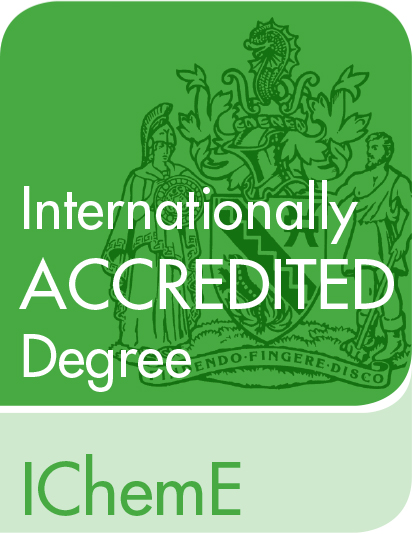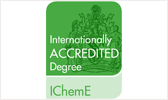Search our site...
Search module
Overview
This course is closed to new applicants for September 2024.
Gain a forward thinking approach to the energy balance of the future by learning how traditional concepts of energy generation can be applied to sustainable processes such as geothermal, tide, wind and solar. The course brings together the essentials of chemical engineering with an added flavour of geoscience, exploration and processing to highlight and develop a deep understanding of the energy mix. It will show how oil and gas techniques can be used to harness geothermal energy, develop concepts of carbon dioxide storage in subsurface environments and inform you on the myriad of renewable energy technologies that are available.
Why Chemical and Energy Engineering at LSBU?
- trophy
- Ranked 1st in the UK for Student Satisfaction for Chemical Engineering (Complete University Guide, 2023).
- laptop
- Ranked 3rd in London for Chemical Engineering (Guardian League Tables, 2022).
- heartbeat
- We’ve recently invested over £400,000 in new teaching facilities dedicated to chemical and energy engineering. That's why we're ranked 1st for Learning Opportunities amongst London competitors in Chemical, Process and Energy Engineering (National Student Survey 2020) with 94% overall satisfaction (NSS 2020).
- puzzle piece
- Exciting employment opportunities - Our students have secured placements and graduate jobs at Pfizer, GSK, Dow and Chevron.
- fa fa-users
- From AI machine learning boot camp to silent film processing, there is a range of extracurricular activities for Engineering students to get involved in.
| ModeFull-time | Duration3 years | Start dateSeptember | Application codeH711 | Application method UCAS |
Course Accreditations
-

ICHEME
Location
London South Bank University student union is located at 103 Borough Rd, London SE1 0AA.
If you are visiting our Southwark Campus, you may wish to use our downloadable campus map (PNG File 466 KB). For information on accessibility, see our DisabledGo access guides. See our location page for more details.
Entry Level Requirements
In order to be considered for entry to the programme you will be required to have:
- A Level (BBB) or;
- BTEC National Diploma (DDM) or;
- Access to HE qualifications with 24 x Distinctions 21x Merits or;
- Equivalent level 3 qualifications, worth 128 UCAS points
- Applicants must hold 5 x GCSEs A-C including Maths and English or equivalent (reformed GCSEs grade 4 or above).
Equivalent international qualifications can be accepted. English language qualifications for international students: IELTS score of 6.0 or Cambridge Proficiency or Advanced Grade C.
Advanced entry
If you have already completed some studies at another university, we may be able to consider you for an advanced entry. Please see our advanced entry page for more information.
Choose your country
Select country here:
Missing English and Maths qualifications?
If you do not have the required English and Maths qualifications needed to satisfy the entry requirements for this programme, we have courses available at our partner College that you can take to upskill in these areas. Find out more at South Bank College.
Advanced entry
If you have already completed some studies at another university, we may be able to consider you for advanced entry. Please see our advanced entry page for more information.
United Kingdom
£9250
Tuition fees for home students
International
£15900
Tuition fees for international students
Tuition fees are subject to annual inflationary increases. Find out more about tuition fees for Undergraduate or Postgraduate courses.
-
Full-time
full-time
BEng (Hons) Chemical and Energy Engineering (FT) - Year 1
UK fee: £9250 International fee: £15900 AOS/LSBU code: 5582 Session code: 1FS00 Total course fee: UK (excluding any optional years): £27750 UK (including any optional years): £27750 International (excluding any optional years): £47700 International (including any optional years): £47700 BEng (Hons) Chemical and Energy Engineering (FT) - Year 2
UK fee: £9250 International fee: £15900 AOS/LSBU code: 5582 Session code: 2FS00 Total course fee: UK (excluding any optional years): £27750 UK (including any optional years): £27750 International (excluding any optional years): £47700 International (including any optional years): £47700 BEng (Hons) Chemical and Energy Engineering (FT) - Year 3
UK fee: £0 International fee: £0 AOS/LSBU code: 5582 Session code: 3FS00 Total course fee: UK (excluding any optional years): £27750 UK (including any optional years): £27750 International (excluding any optional years): £47700 International (including any optional years): £47700 BEng (Hons) Chemical and Energy Engineering (FT) - Year 4
UK fee: £9250 International fee: £15900 AOS/LSBU code: 5582 Session code: 4FS00 Total course fee: UK (excluding any optional years): £27750 UK (including any optional years): £27750 International (excluding any optional years): £47700 International (including any optional years): £47700
For more information, including how and when to pay, see our fees and funding section for undergraduate students.
Please check your fee status and whether you are considered a Home, EU or International student for fee-paying purposes and for our regulatory returns, by reading the UKCISA regulations.
See our Tuition Fees Regulations (PDF File 391 KB) and Refund Policy (PDF File 775 KB).
Possible fee changes
The University reserves the right to increase its fees in line with changes to legislation, regulation and any government guidance or decisions.
The fees for international students are reviewed annually and the University reserves the right to increase the tuition fees in line with the RPIX measure of inflation up to 4 per cent.
Scholarships
We offer several types of fee reduction through our scholarships and bursaries. Find the full list and other useful information on our scholarships page.
International students
The course is not currently open to international students.
International (non Home) applicants should follow our international how to apply guide.
Home
| Mode Full-time | Duration 3 years | Start date September | Application code H711 | Application method UCAS |
Accommodation
Once we have made you an offer, you can apply for accommodation. You can rent from LSBU and you’ll deal directly with the university, not third party providers. That means we can guarantee you options to suit all budgets, with clear tenancy agreements and all-inclusive rents that include insurance for your personal belongings, internet access in each bedroom and on-site laundry facilities.
Or, if you’d rather rent privately, we can give you a list of landlords – just ask our Accommodation Service.
Read more about applying for accommodation at LSBU.
Finance
You don't need to wait for a confirmed place on a course to start applying for student finance. Read how to pay your fees as an undergraduate student.
Prepare to start
Applicant events
After you’ve received your offer we’ll send you emails about events we run to help you prepare for your course.
Enrolment
Before you start your course we’ll send you information on what you’ll need to do before you arrive and during your first few days on campus. You can read about the process on our Enrolment pages.
This course is distinctive as it covers the theory of chemical engineering coupled with computer simulation, laboratory practice and industrial placement that enable graduates to be well equipped with desired skills sought after by employers. It also has the added value of introducing topics that are important for future energy mixed with a focus on renewables as well as oil & gas.
The total credit value of the course is 360 credits which are made up of 14 standard (20 points) modules and one final year project module of 40 points. Each year you need to complete 120 credits.
In the first year, you are introduced to basic engineering practice, design engineering and fundamentals of chemical engineering. The second year focuses on core unit operations such as fluid flow, thermodynamics, chemical reactions, separation processes, process -design,-simulation and -control.
In the final year, the course trains you in specific areas of sustainable energy, energy technologies, and earth resources of energy and enhance how it works on the large scale
Also, in the final year project, the students will apply all the knowledge gained throughout the course into a design project, which typically covers all aspects of an industrial scale process design from raw materials feedstock to final market valuable products taking into account cost estimation, HAZOP, environmental impact &sustainability analysis as well as scaling operational units to optimization.
After two-years study, you are encouraged to have one-year industrial placement (sandwich course) which LSBU can provide you with support how to search via Careers Hub.
Year 1
- Introduction to chemical engineering
This module provides you with an understanding of the chemical industries, their economic significance and the career pathways available to professional engineers in these industries. It also equips you with basic principles of chemical processes such as mass and energy balances. - Engineering mathematics and modelling
This module consolidates your knowledge of a broad range of mathematical methods and techniques appropriate for engineering courses, and enables you to apply mathematical methods, tools and notations proficiently in the analysis and solution of engineering problems. - Engineering principles
This module consolidates your knowledge and understanding of a broad range of engineering principles such as measurement systems and units, thermal physics and mechanical and electrical principles. The teaching is supported by laboratory experiments. - Engineering principles 2
This module develops your knowledge of engineering concepts such as material science, fluid mechanics and thermodynamics, allowing them to be further developed in future years of study. - Design and practice
The aim of the module is for you to begin your engagement with engineering design and develop your transferable skills by. You will undertake small engineering design projects, learn to use Computer-Aided Design (CAD) software, and develop your Personal Development Planning (PDP). - Computing for chemical engineering
The module provides you with an understanding of the principles of programming and the use of programming languages. It enables to solve chemical engineering problems using numerical techniques and programming languages such as Matlab software.
Year 2
- Advanced engineering mathematics and modelling
This module develops your knowledge of advanced engineering mathematics, and the skills which enable you to apply mathematical methods and tools proficiently in the analysis and solution of a variety of engineering problems. - Thermodynamics
This module provides you with the fundamental principles of thermodynamics (heat, energy and power) and their role in chemical engineering processes and systems. The teaching is supported by laboratory experiments. - Separation processes
This module equips you with an understanding on the scientific principles underlying separation processes such as distillation and absorption, and their fundamentals design procedures. The teaching is supported by laboratory experiments. - Chemical engineering processes 1
This module imparts your knowledge and understanding in heat, mass and momentum transfer, describing classical and modern theories and techniques. It also provides you with principles of reaction engineering. The teaching is supported by laboratory experiments. The teaching is supported by laboratory experiments. - Principles of control
This module is designed to provide you with a good foundation in control systems. The main aim is to provide the tools to mathematically model dynamical systems, predict their time and frequency responses, analyse their stability and understand the role of feedback loops to modify the behaviour of a system. - Process design and simulation
This module introduces the principles of process design, flowsheeting and flowsheet calculations, process simulation, as well as process economics and concepts such as capital and operating costs. It also introduces heat exchanger design and concept of pinch analysis.
Year 3
- Optional placement year
Year 4
- Design project
This module enhances and builds on your knowledge and ability to design a chemical plant with the opportunity to propose new and/or innovative processes. It improves your communication skills and self-esteem through weekly feedback sessions, and your ability to work in a team as well as individually. - Earth Resources
The aim of this module is to introduce you geological knowledge in order to understand energy systems from geothermal and fossil fuel sources. This covers knowledge, understanding and practical skills you need to analyse the contribution of such systems for meeting future energy requirements - Emerging Energy and Sustainability
This module will focus on the emerging field of renewable power and fuel generation that jointly will reduce the global CO2 emission. The concept of consumable energy will be clarified and related to various technologies of energy storage such as hydrogen storage, batteries and capacitors. - Fluid flow and process control
This module further develops your knowledge of control strategies for complex systems. You will also gain knowledge of the fundamentals of compressible fluid flow for engineering systems such as nozzles, fluidised beds, and two-phase flow in a liquid-gas system. - Energy Technologies
This module is about the sciences behind technologies involved in energy generation and utilisation. It develops a broad overview of energy engineering and the current status of important issues surrounding energy supply and demand.
Careers
Employability Service
At LSBU, we want to set you up for a successful career. During your studies – and for two years after you graduate – you’ll have access to our Employability Service, which includes:
- An online board where you can see a wide range of placements: part-time, full-time or voluntary. You can also drop in to see our Job Shop advisers, who are always available to help you take the next step in your search.
- Our Careers Gym offering group workshops on CVs, interview techniques and finding work experience, as well as regular presentations from employers across a range of sectors.
Our Student Enterprise team can also help you start your own business and develop valuable entrepreneurial skills.
Energy and chemical engineering are growth sectors for the UK and across the world. The solutions to our current problems will be solved by creative and energetic engineers; this is your time to make a difference.
LSBU has an enviable reputation for employability and entrepreneurship. Our graduates find opportunities across the world and make an impact wherever they go. The combination of Engineering and LSBU’s focus on high-quality teaching and skills development with a vocational drive is key to the success of our graduates. Study with us and doors will open as you embark on the journey that is your career.
This degree opens a wealth of sectors to you: chemical industries, food and drink industry, pharmaceuticals and oil & gas industries. In particular, you will be trained for a career in the energy sector. Duties may involve project leading, leading environmental decision makings or participate in energy optimisations and retrofitting existing designs or be a research and development engineer working on new plants, systems and processes.
The students in our BEng course may wish to transfer to the corresponding MEng Chemical and Energy Engineering if qualified, or apply for any of the divisions MSc courses; Advanced Chemical Engineering, MSc Future Energy Engineering or MSc Process Safety.
There are also several opportunities to apply to a PhD in Chemical Process and Energy Engineering in our Division
The programme has been designed to give maximum opportunity to demonstrate the skills required for a full career using the techniques learned on the course.
This degree is accredited by the Institute of Chemical Engineers (IChemE) on behalf of the Engineering Council for the purposes of fully meeting the academic requirement for registration as a Chartered Engineer.
The Institution of Chemical Engineers (IChemE) is the global professional membership organisation for people with relevant experience in chemical engineering. Having this accreditation helps progression towards Chartered Engineer status, which is an internationally recognised qualification.
Accreditation is a mark of assurance that the degree meets the standards set by the Engineering Council in the UK Standard for Professional Engineering Competence (UK-SPEC).
An accredited degree will provide you with some or all of the underpinning knowledge, understanding and skills for eventual registration as an Incorporated (IEng) or Chartered Engineer (CEng).
Some employers recruit preferentially from accredited degrees, and an accredited degree is likely to be recognised by other countries that are signatories to international accords.

- IChemE is the global professional membership organisation for people with relevant experience in chemical engineering. Having this accreditation helps progression towards Chartered Engineer status, which is an internationally recognised qualification.
Teaching and Assessment
As the teaching team in the Division of Chemical and Energy Engineering, we are enthusiastic about our teaching and research. We are a multidisciplinary team with expertise in chemical engineering, energy engineering, and materials engineering, some with industrial experience.
All modules are taught through a combination of three or more of lectures, tutorials, computer workshop, laboratory practical, seminars and group work which deliver the intended knowledge and understanding, and intellectual/practical/transferrable skills. There are workshops which are run by external guest lecturers from relevant industries.
Most modules are assessed through both examination and individual/group coursework, with typical weightings of 70% examination and 30% coursework. There are a few modules which are based on 100% coursework throughout your studies mainly with focus on process or product design.
Your personal tutor is assigned during the first three weeks of starting the course. Your personal tutor will be your first point of contact should you have any questions about the course, academic regulations, and the university facilities to support your studies. You will have a couple of timetabled meetings with your personal tutor each semester during the first year to get to know them.







